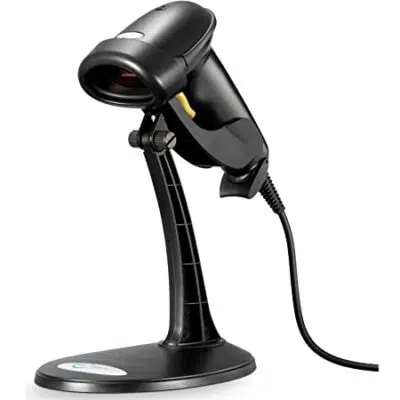Professional Barcodes Scanners for Optimal Business Productivity
Professional Barcodes Scanners for Optimal Business Productivity
Blog Article
Choosing the Right Barcode Scanner for Your Business Requirements
Selecting the proper barcode scanner for your organization needs a nuanced understanding of your specific functional requirements and ecological problems. Elements such as scanner type, speed, and compatibility with existing systems play an essential duty in establishing the ideal selection.
Comprehending Barcode Scanner Types
When it comes to picking a barcode scanner, understanding the numerous types available is important for meeting specific company demands. Barcode scanners can be categorized right into several types, each made for various applications and settings.
Fixed-mount scanners, on the various other hand, are designed for high-volume scanning applications, often found in setting up lines or check out counters. These scanners are mounted in a fixed placement, allowing for quick scanning of several items in sequence.
One more kind is the mobile computer system, which incorporates scanning abilities with calculating power. These devices are excellent for field procedures or stockroom monitoring, enabling information collection and real-time stock monitoring. Furthermore, there are commercial scanners that are built to endure rough settings, such as extreme temperature levels or direct exposure to dirt and wetness.

Secret Attributes to Take Into Consideration
What important functions should organizations prioritize when picking a barcode scanner? Firstly, scanning speed is essential, as faster scanners improve operational efficiency, particularly in high-volume atmospheres. The scanner's capacity to check out different barcode formats is also crucial; guarantee it supports prominent kinds like QR codes, UPC, and Code 128 to accommodate diverse supply items.
Resilience is an additional key attribute, specifically for companies in rugged settings. Try to find designs that are developed to stand up to declines, dust, and moisture. Additionally, consider the connection alternatives offered; whether you like USB, Bluetooth, or Wi-Fi, the ideal connectivity can improve integration with existing systems.

Assessing Your Organization Setting
To effectively select a barcode scanner, companies have to take supply of their certain functional atmosphere. This evaluation includes examining the physical layout of the work area, the nature of the products being scanned, and the typical problems under which scanning takes place. For circumstances, a retail environment may call for handheld scanners that can swiftly process deals at the checkout, while a storehouse setup may gain from ruggedized scanners created to endure harsher problems.
Additionally, think about the volume of scanning required. High-throughput settings may require sophisticated scanning technologies, such as fixed-position scanners or smart phones that can operate efficiently in hectic situations. The combination abilities with existing inventory management systems likewise play a vital function; make certain the selected scanner can perfectly attach with software program systems in operation.
Additionally, assess the potential for development and scalability. A scanner that satisfies current needs might not suffice as organization expands. By thoroughly analyzing these variables, go to website businesses can choose a barcode scanner that not only satisfies prompt needs but additionally supports lasting operational performance and versatility. This tactical approach eventually adds to smoother procedures and improved efficiency.
Budgeting for Your Scanner
Having examined the functional atmosphere and identified Discover More Here the specific demands for a barcode scanner, the following step includes careful budgeting to make certain a smart monetary investment. Developing a spending plan begins with determining the overall prices connected with the scanner, consisting of first purchase cost, operational costs, and prospective maintenance charges.
When selecting a barcode scanner, take into consideration the variety of readily available alternatives, from handheld tools to fixed-position scanners, as prices can vary dramatically. It is necessary to stabilize expense with performance; going with an extra budget-friendly model may bring about raised operational inadequacies if it does not fulfill your service demands.
Along with the hardware, consider prices associated with software, training, and prospective upgrades. While it may be tempting to minimize ahead of time expenditure, investing in a high quality scanner that aligns with your functional demands can generate lasting financial savings through improved effectiveness and minimized downtime.
Finally, consider the overall expense of ownership, which includes the scanner's lifespan and possible resale worth. By diligently planning your budget, you can make sure that your financial investment in a barcode scanner will certainly boost your functional performance and monetary efficiency.
Assimilation With Existing Solution
Incorporating a barcode scanner with your existing systems is important for maximizing its efficiency and ensuring smooth procedures. barcodes scanners. A well-integrated scanner improves process efficiency, lowers mistakes, and increases information handling. When selecting a barcode scanner, take into consideration compatibility with your present software application and hardware facilities, including your inventory administration systems, point-of-sale (POS) systems, and business source planning (ERP) options
Examine whether the scanner utilizes conventional procedures such as USB, Bluetooth, or Wi-Fi, which can facilitate simple integration. In addition, analyze whether the scanner's software program uses APIs or SDKs that permit personalization and assimilation with proprietary systems. This is specifically vital for organizations with one-of-a-kind functional needs.
In addition, think about the scalability of the scanning option. As your company grows, your systems ought to be able to suit extra scanners and manage raised information quantities without significant reconfiguration. Ultimately, investing in a barcode scanner that perfectly integrates with your existing the original source systems will yield lasting benefits, enhancing precision, efficiency, and total efficiency within your procedures. Put in the time to thoroughly examine your assimilation requires before making a purchase decision.

Verdict
In conclusion, picking a suitable barcode scanner necessitates a detailed examination of various elements, consisting of scanner types, vital features, and the specific organization setting. The right barcode scanner serves as a vital tool in enhancing procedures and assisting in effective inventory management.
Report this page